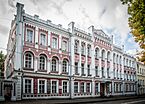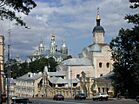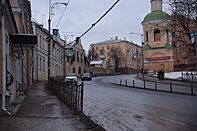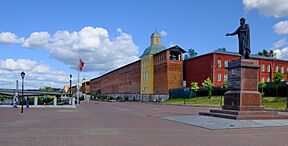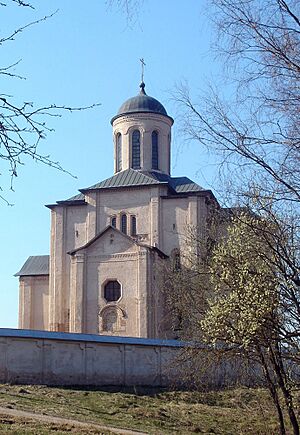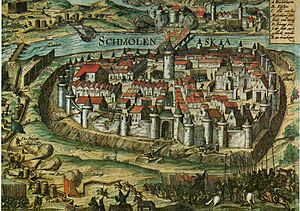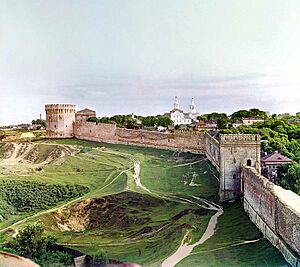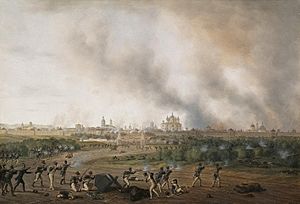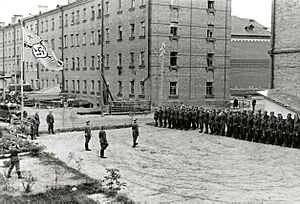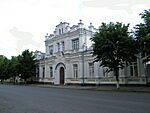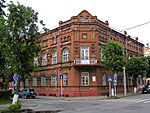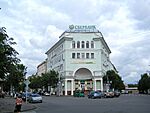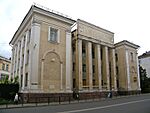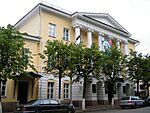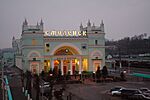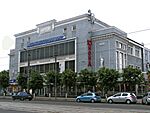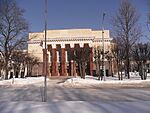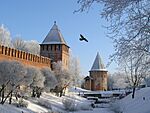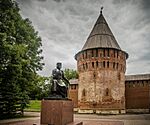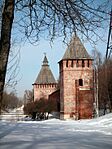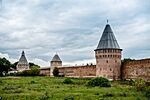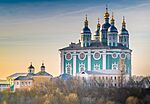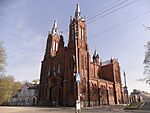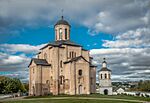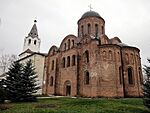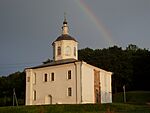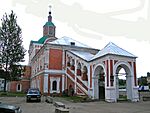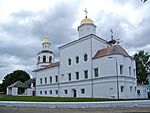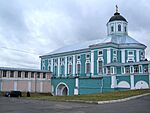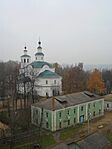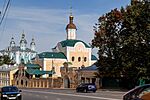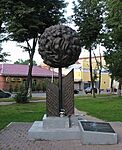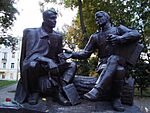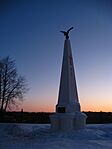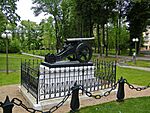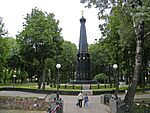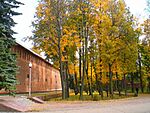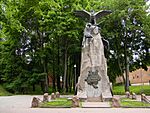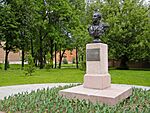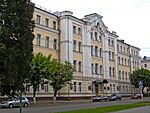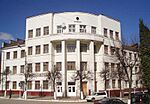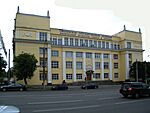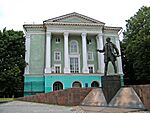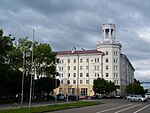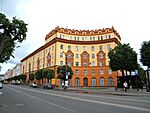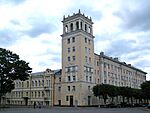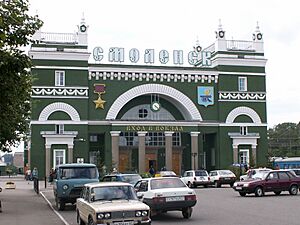Smolensk facts for kids
Quick facts for kids Smolensk (English)Смоленск (Russian) |
|
|---|---|
| - City - | |
| [[File:
|
|
|
|
|
| Administrative status | |
| Country | Russia |
| Federal subject | Smolensk Oblast |
| Administratively subordinated to | Smolensk Urban Okrug |
| Municipal status | |
| Urban okrug | Smolensk Urban Okrug |
| Head | Alexander Novikov |
| Representative body | City Council |
| Statistics | |
| Area | 166.35 km2 (64.23 sq mi) |
| Population (2010 Census, preliminary) |
326,861 inhabitants |
| - Rank in 2010 | 54th |
| Density | 1,965/km2 (5,089/sq mi) |
| Time zone | MSK (UTC+04:00) |
| First mentioned | 863 |
| Postal code(s) | 214ХХХ |
| Dialing code(s) | +7 4812 |
| Official website: http://www.smoladmin.ru | |
Smolensk is a city in Russia. It is the main city of Smolensk Oblast. The city is located on the Dnieper River. It is about 360 kilometers (220 mi) west-southwest of Moscow. Smolensk was first mentioned in 863. This makes it one of Russia's oldest cities.
In 2021, about 316,570 people lived in Smolensk.
Contents
What's in a Name?
The city's name comes from the Smolnya River. This river flows through parts of northwestern Russia. The name of the river itself is a bit of a mystery.
- One idea is that it comes from an old Slavic word, smol (смоль). This word means "black soil." The river's water might have looked dark because of this soil.
- Another idea is the Russian word smola (смола). This means "resin," "tar," or "pitch." Many pine trees grow in the area. Long ago, Smolensk was a place where people processed and traded resin.
Where is Smolensk?
Smolensk is in European Russia. It sits on the upper part of the Dnieper River. The river flows through the city from east to west. It divides Smolensk into two main parts.
The city is built on seven hills. The older part of Smolensk is on the high, southern bank of the Dnieper River. This area has many hills, small rivers, and valleys.
A Look Back at Smolensk's History
Smolensk is one of the oldest cities in Russia. It has a long and important history.
Early Days
Smolensk was first written about in 863 AD. This was just two years after Kievan Rus' was founded. The city was an important stop on the "trade route from the Varangians to the Greeks." This was a major trade path.
Traders would sail their boats up the Daugava River. Then, they would carry their boats over land to the Dnieper River. In Smolensk, they would fix any leaks in their boats using tar. This might be why the city got its name.
In 1054, the Principality of Smolensk was formed. The city grew quickly because of its central location. By the late 1100s, Smolensk was one of the strongest areas in Eastern Europe. Many churches were built during this time. One famous church, Svirskaya, was built in 1197. People at the time thought it was the most beautiful building east of Kiev.
Between Two Powers
![]() Grand Duchy of Lithuania 1404–1514
Grand Duchy of Lithuania 1404–1514
![]() Grand Duchy of Moscow 1514–1547
Grand Duchy of Moscow 1514–1547
![]() Tsardom of Russia 1547–1611
Tsardom of Russia 1547–1611
![]() Poland–Lithuania 1611–1656
Poland–Lithuania 1611–1656
![]() Tsardom of Russia 1656–1721
Tsardom of Russia 1656–1721
![]() Russian Empire 1721–1812
Russian Empire 1721–1812
![]() French occupation 1812
French occupation 1812
![]() Russian Empire 1812–1917
Russian Empire 1812–1917
![]() Russian Republic 1917–1918
Russian Republic 1917–1918
![]() Belarusian People's Republic 1918–1919
Belarusian People's Republic 1918–1919
![]() Socialist Soviet Republic of Byelorussia 1919
Socialist Soviet Republic of Byelorussia 1919
![]() Russian SFSR 1919–1922
Russian SFSR 1919–1922
![]() Soviet Union 1922–1941
Soviet Union 1922–1941
![]() German occupation 1941–1943
German occupation 1941–1943
![]() Soviet Union 1943–1991
Soviet Union 1943–1991
![]() Russia 1991–present
Russia 1991–present
Smolensk was not attacked by the Mongol armies in 1240. However, it had to pay tribute to the Golden Horde. Over time, Smolensk became a key city in the fight between the Grand Duchy of Lithuania and the Grand Duchy of Moscow.
Lithuania took the city three times between 1395 and 1408. In 1514, Vasily III of Russia took Smolensk for Russia. To celebrate, he built the Novodevichy Convent in Moscow.
To protect the city from future attacks, Boris Godunov built strong walls around it. The Smolensk Kremlin, built from 1597 to 1602, is the largest in Russia. It has thick walls and many watchtowers. Even with these strong defenses, the Polish–Lithuanian Commonwealth captured the city in 1611 after a long siege. Smolensk was part of Poland-Lithuania for 43 years.
In 1654, Russia recaptured Smolensk. In 1667, Poland-Lithuania officially gave up its claim to the city.
Modern Times
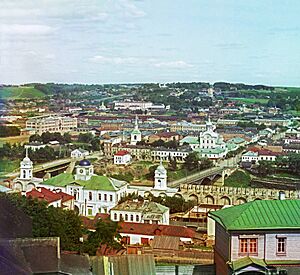
Smolensk has always been important to Russians. Its cathedral held a very special religious icon. Building the new Cathedral of the Assumption took over a century. Even though Smolensk became less important economically, Russian leaders still valued it as a key fortress protecting the way to Moscow.
In August 1812, a huge battle took place in Smolensk. This was during Napoleon's invasion of Russia. Napoleon entered the city after a difficult fight. Many soldiers were lost on both sides. Today, a monument called the Eagles monument stands in central Smolensk. It was built in 1912 to mark 100 years since Napoleon's campaign.
World War II and Beyond
In 1940, a sad event known as the Katyn Massacre happened near Smolensk. Around 22,000 Polish prisoners of war were killed.
During World War II, Smolensk saw heavy fighting again. German forces captured the city on July 16, 1941. The city was almost completely destroyed during the battles. Over 93% of Smolensk was ruined. The ancient icon of Our Lady of Smolensk was lost.
In late 1943, Smolensk was finally freed by Russian forces. After the war, Smolensk was given the special title of Hero City. This honor is given to cities that showed great bravery during the war.
In 2010, a military jet carrying the Polish president and other important people crashed near Smolensk. All 96 people on board died. They were going to a ceremony to remember the Katyn Massacre.
In 2013, Smolensk celebrated its 1,150th anniversary. The city had many new buildings and renovations. Russia's Central Bank even made special coins to celebrate.
Places to See in Smolensk
Smolensk has a long and rich history. Because of this, it has many beautiful buildings. These buildings show different styles of Russian architecture. Even though the city was destroyed many times, many important historical buildings still stand.
- The Cathedral of the Assumption
- The Immaculate Conception Church
- The Church of St. Michael the Archangel (one of the few buildings left from before the Mongol invasion)
The Smolensk Kremlin
The Smolensk Kremlin was built in the late 1500s. It was built under the architect Fyodor Kon. It is one of the greatest examples of Russian medieval architecture. It is also a great example of military engineering.
Churches and Cathedrals
Monuments and Memorials
Smolensk has been the site of many important battles. Because of this, it has many monuments. These monuments remember its rich military history.
Lopatinsky Garden
Square of Memory of Heroes
-
The bust of Mikhail Kutuzov
Education Buildings
Post-War Buildings
Economy and Transportation
Smolensk has several factories. These include the Smolensk Aviation Plant. There are also factories that make electronics and farm machinery.
Getting Around
Smolensk is on the M1 main highway. It is also on the Moscow–Brest Railway. There has been a train connection to Moscow since 1870.
Public transport in the city includes:
- Buses
- Trolleybuses
- Trams
- Marshrutkas (shared taxis)
There are two airports near the city. However, they do not have regular flights.
Learning in Smolensk
Smolensk is home to important universities. These include:
- Smolensk State University (SMOLGU)
- Smolensk State Medical University (SSMU)
There are also many colleges and other schools.
Sister Cities
Smolensk is connected with other cities around the world. These are called "sister cities."
 Colorado Springs, United States (1993– suspended 2022)
Colorado Springs, United States (1993– suspended 2022) Hagen, Germany (1985)
Hagen, Germany (1985) Kerch, Ukraine (2000)
Kerch, Ukraine (2000) Kragujevac, Serbia (2009)
Kragujevac, Serbia (2009) Targovishte, Bulgaria (2002)
Targovishte, Bulgaria (2002) Tulle, France (1981)
Tulle, France (1981) Vitebsk, Belarus
Vitebsk, Belarus
Famous People from Smolensk
Many notable people have connections to Smolensk:
- Yuri Gagarin (1934–1968), a famous cosmonaut (space traveler)
- Mikhail Glinka (1804–1857), a well-known composer
- Eduard Khil (1934–2012), a popular singer
- Patriarch Kirill of Moscow (born 1946), a religious leader
- Semyon Lavochkin (1900–1960), an aircraft designer
- Aleksandr Tvardovsky (1910–1971), a writer
Special Honors
The Smolensk Strait in Antarctica is named after the city. It is located between Livingston Island and Deception Island.
There was a plan after World War II to build a light cruiser ship named Smolensk. However, it was never built.
See also
 In Spanish: Smolensk para niños
In Spanish: Smolensk para niños
 | Emma Amos |
 | Edward Mitchell Bannister |
 | Larry D. Alexander |
 | Ernie Barnes |


